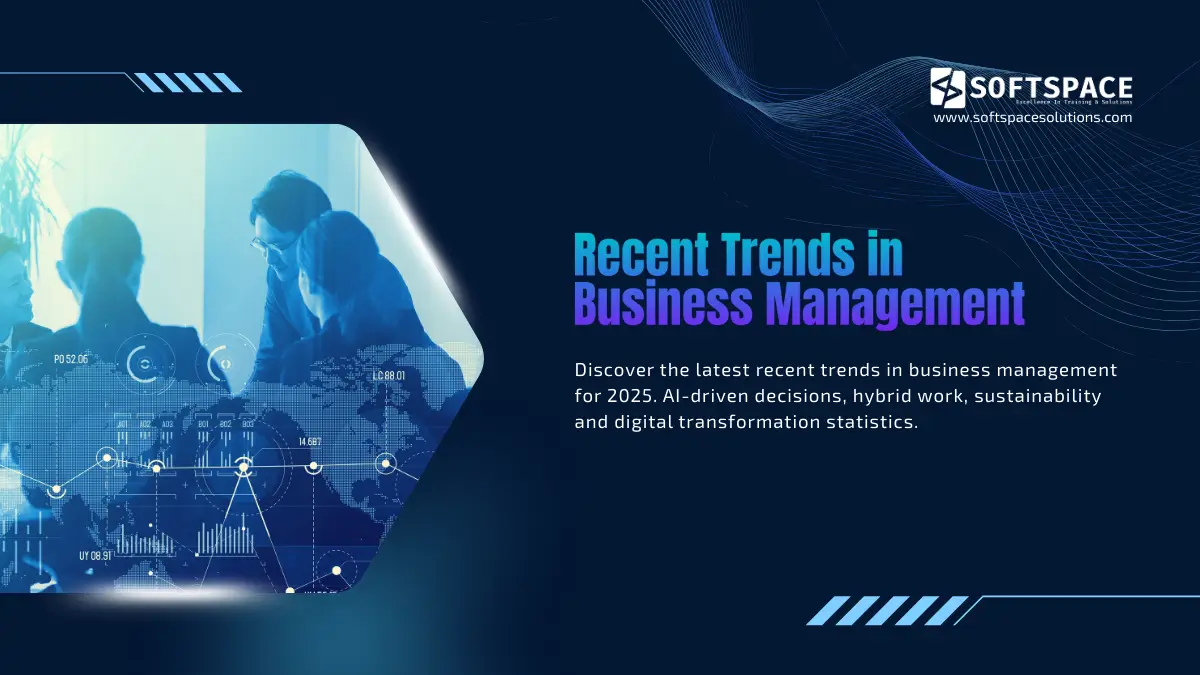This is the most dynamically evolving business environment in history, and to stay competitive, the leaders and professionals of such organisations must be willing to adapt to the most recent trends in Business Management.
Being a would-be leader, an entrepreneur and a manager, you have to organise your business in its motion about such changes to make it stable in the long term.
One of the most efficient methods on how to learn and applying emerging practices is to enrol in management courses, as it gives you the instruments that will help you to navigate the modern environment and seize new opportunities.
Today, we discuss the future of business management trends in 2025 and the top 15 business management trends outlined in this article.
Table of Contents

What is business management?
Business management refers to the action, art, or practice via which one plans, organises, leads, and controls the resources of a business, like technology, people, and finance, in the process of attaining particular objectives efficiently and effectively.
It entails installing plans and decisions and facilitating an effective flow of work in various offices. Business administrators coordinate such activities as budgeting, staffing, monitoring of performance and process enhancements, among others, and coordinate the activities with the corporate mission and vision of the organisation.
Good management in business also incorporates responses to market changes, innovation, and good relations with future stakeholders.
Business management is provided through various knowledge and skill sets that include leadership, problem-solving, and analysis, assisting organisations in ensuring their competitiveness and attaining a long-term growth strategy and the provision of value to customers, employees, and shareholders.
Without it, not only will no successful enterprise be possible, but no business of any size and in any industry will be able to succeed at all.
Recent Trends in Business Management
Discover the latest statistics and insights shaping the future of business in 2025
AI-Driven Decision Making
Artificial Intelligence has become the cornerstone of modern business strategy, transforming how organizations process data and make critical decisions.
- AI eliminates 85M jobs but creates 97M new ones by 2025
- 77% of devices now feature AI technology
- 20-30% productivity gains reported across industries
Remote & Hybrid Work Optimization
The workplace revolution continues with advanced hybrid models that balance flexibility with collaboration effectiveness.
- 13-50% productivity increase in remote work
- $11,000 annual cost savings per remote employee
- 60% office space optimization with smart scheduling
Sustainability-Driven Models
Environmental consciousness has evolved from CSR to core business strategy, driving competitive advantage and customer loyalty.
- Sustainable brands grow 5.6x faster than competitors
- $500B green bonds market in 2023
- 10% higher profitability for ESG-focused companies
Emotional Intelligence in Leadership
As AI handles technical tasks, human-centric skills like empathy and emotional awareness become premium leadership assets.
- 58% better adaptation to change with EI leaders
- 85% completion rate for EI training programs
- 40% improvement in global team effectiveness
Data-Driven Personalization
Advanced analytics enable companies to create highly personalized experiences for customers and employees alike.
- 6-10% revenue increase from personalization
- 29% higher open rates for personalized emails
- 50% reduction in customer acquisition costs
Agile Project Management
Agile frameworks have expanded beyond tech teams to transform entire organizational structures across all industries.
- 37% improvement in time-to-market across industries
- 40% reduction in time-to-hire with agile HR
- 10-15% increase in customer satisfaction scores
Continuous Learning & Upskilling
The rapid pace of change demands continuous education, with skills having a half-life of just 2-5 years.
- 17% better retention with microlearning modules
- 60% improvement with AI-powered learning paths
- 53% reduction in employee turnover
Advanced Digital Transformation
Digital transformation in 2025 goes beyond automation to strategic integration of cutting-edge technologies.
- 67% supply chain transparency improvement with blockchain
- 30% operational cost reduction with IoT
- 85% latency reduction with edge computing
E-commerce & Digital Sales
Digital commerce continues explosive growth with new technologies enhancing customer experience and operational efficiency.
- Subscription businesses grow 5x faster than traditional models
- 300-400% increase in customer lifetime value
- 92% customer retention rates for SaaS models
Employee Experience Focus
Organizations prioritizing employee experience show significantly higher profits and better business outcomes.
- 10% higher customer loyalty with engaged employees
- 45% satisfaction increase with flexible benefits
- 14% performance improvement with recognition programs
Resilience & Risk Management
Modern businesses face complex risk landscapes, making comprehensive resilience planning essential for survival and growth.
- 50% faster crisis response with scenario planning
- 15% higher profit margins during crises
- 60% reduction in downtime costs
1. AI-Driven Decision-Making
Artificial intelligence has evolved from a supporting instrument to the mainstay of contemporary corporate strategy. According to McKinsey’s 2024 Global Survey, 73% of companies are already using AI to improve decision-making processes, demonstrating the recent trends.
Important Areas of Implementation:
- Predictive analytics: Businesses such as Netflix use artificial intelligence (AI) algorithms to forecast user behaviour, and their viewing recommendations have a 75% accuracy rate.
- Risk assessment: By using AI to score credit, financial institutions can cut default rates by as much as 30%.
- Supply chain optimisation: Amazon’s AI-powered supply chain management has improved delivery times and cut operating expenses by 20%.
Advantages from a Strategic Standpoint:
- Amazon processes 2.5 quintillion bytes of data every day to identify market trends.
- 85% fewer human errors in standard decision-making procedures
- The speed of strategic pivoting has increased, allowing for five times faster decision-making compared to conventional techniques.
2. Optimisation of Remote and Hybrid Work
One of the most important recent developments in business management is the alteration of workplace dynamics. According to studies, 82% of American workers currently work in hybrid arrangements, and 42% of them work remotely full-time.
Among the Advanced Hybrid Models Are:
- Smart office scheduling: AI-powered booking systems are used by Microsoft and other companies to maximise office space utilisation by 60%.
- VR for remote meetings: Businesses that use virtual reality (VR) for remote meetings report 35% higher engagement rates.
- Performance based on outcome measures: Businesses that prioritise outcomes over hours are 21% more productive.
Statistics of Implementation:
- Across a range of industries, remote work productivity has increased by 13–50%.
- Compared to traditional office settings, employee satisfaction in hybrid models is 31% higher.
- On average, each remote worker saves $11,000 a year.
3. Business Models Driven by Sustainability
Corporate social responsibility has given way to environmental consciousness as a fundamental business strategy. 88% of consumers want brands to help them live more sustainably, according to recent trends in.
Wholesome Integration of Sustainability:
- Circular economy practices: Patagonia has made an extra $100 million in revenue through its repair and reuse programme.
- Carbon-neutral activities: A $1 billion climate innovation fund is part of Microsoft’s pledge to become carbon negative by 2030.
- Sustainable supply chains: Through sustainable sourcing, Unilever has improved brand reputation while cutting costs by 15%.
Effect on the Market:
- Compared to traditional competitors, sustainable brands grow 5.6 times faster.
- Businesses with an ESG focus are 10% more profitable.
- In 2023, the market for green bonds reached $500 billion, demonstrating investor confidence.
4. Leadership and Emotional Intelligence (EI)
Automation now handles technical tasks, making human-centric skills valuable assets. Emotional intelligence is one of the most important new trends in business management, as research indicates that 90% of high performers have it.
Applications of Emotional Intelligence in Contemporary Leadership:
- Conflict resolution: Leaders with high EI settle disputes at work 67% more quickly.
- Team performance: Teams with managers who possess emotional intelligence are 20% more productive.
- Adaptability: Organisations with leaders trained in EI exhibit 58% greater adaptability to change.
Strategies for Development:
- 360-degree feedback mechanisms for evaluating leadership
- Programs for training empathy and mindfulness that have an 85% completion rate
- Workshops on cross-cultural communication increase the effectiveness of international teams by 40%
5. Customisation Based on Data
The new norm for employee and customer engagement is personalisation. Personalised experiences can boost revenue by 6–10%, according to recent trends in business management.
Applications of Personalisation:
- Customer experience: Amazon’s recommendation engine drives 35% of total sales.
- Employee engagement: Personalised learning paths increase completion rates by 90%.
- Marketing initiatives: Tailored email campaigns have 29% higher open rates.
Integration of Technology:
- Every day, machine learning algorithms process more than 1 terabyte of customer data.
- Real-time personalisation reduces customer acquisition costs by 50%.
- Systems for delivering dynamic content increase conversion rates by 202%.
6. Project Management That Is Agile
The agile methodology now covers entire organisational structures, in addition to software development. According to studies, 71% of businesses currently employ agile methodologies, which is indicative of important new developments in business management.
Implementing Agile Across Industries:
- Marketing: Agile teams launch campaigns 67% more quickly.
- Human resources: Agile HR procedures cut down on hiring time by 40%.
- Financial services: Agile budgeting cycles achieve a 25% increase in financial responsiveness.
Metrics of Performance:
- Agile projects are 28% more likely to succeed.
- Across all industries, time-to-market improvements average 37%.
- Agile approaches result in a 10–15% increase in customer satisfaction scores.
7. Ongoing Education and Skill Development
Since learnt skills have a half-life of only two to five years, ongoing education is crucial. 94% of workers would stay longer at companies that invest in their learning.
Contemporary Educational Frameworks:
- 15-minute sessions of microlearning modules demonstrate a 17% increase in knowledge retention.
- AI-powered learning paths: Tailored courses that increase skill acquisition by 60%
- Virtual reality training: Immersive learning experiences that result in 75% higher engagement rates
Returns on Investments:
- Comprehensive training programmes increase a company’s revenue per employee by 218%.
- Upskilling programmes reduce employee turnover by 53%.
- The average annual cost of learning and development for each employee is $1,111.
8. Beyond Automation, Digital Transformation
In 2025, digital transformation will involve more than just process automation; it will involve strategic technology integration. 89% of businesses have implemented or intend to implement a digital-first business strategy, according to recent trends in business management.
Integration of Advanced Technology:
- The implementation of blockchain technology leads to a 67% increase in supply chain transparency.
- IoT connectivity: 30% lower operating costs thanks to smart sensors
- Edge computing: Reduces latency by 85% by processing data locally
Strategic Results:
- 23% increases in revenue for businesses with advanced digital capabilities
- Improvements in customer experience are 35% on average
- 40–50% increases in operational efficiency in redesigned processes
9. DEI as a Strategic Priority: Diversity, Equity, and Inclusion
DEI programmes are now strategic business imperatives rather than just compliance requirements. Businesses with ethnic diversity in the top quartile have a 33% higher chance of outperforming their peers financially.
Implementing DEI Strategically:
- Inclusive hiring practices: 25% more diverse hires are made through blind recruitment procedures
- Leadership development: 89% retention rates for under-represented groups in mentoring programs
- Cultural transformation: Thorough training on bias reduces workplace incidents by 45%
Impact on Business:
- Decisions are better made by diverse teams
- Innovation leaders are 1.7 times more likely to operate inclusive businesses, doing so 87% of the time
- A 25% increase in profitability is associated with gender-diverse leadership teams
10. As-a-Service and Subscription Business Models
Over the last ten years, the subscription economy has grown by 435%. According to recent business management trends, 78% of companies currently provide some kind of subscription service.
Diversification of Industry:
- Equipment-as-a-Service: Cutting capital expenditures for customers by 40%
- Software: SaaS models achieve 92% customer retention rates
- Healthcare: Since 2020, telemedicine subscriptions have increased by 3,000%
Benefits to Revenue:
- Revenues from subscription businesses increase five times faster than those from traditional models
- Subscription models increase customer lifetime value by 300–400%
- Reliable sources of income increase a company’s value by 6–8 times
11. Employee Experience as a Factor in Growth
Businesses that see employee experience as a competitive advantage outperform their peers in terms of profitability. Engaged employees are 23% more profitable, according to recent trends in business management.
Techniques for Improving Experience:
- Flexible benefits: 45% more satisfaction thanks to customised packages
- Career pathing: Unambiguous prospects for growth that cut turnover by 35%
- Mental health support: Wellness initiatives that yield a $3.27 return on investment for every dollar spent
Measurable Results:
- 10% more customers are loyal to businesses with engaged staff
- A 12% improvement in business outcomes is correlated with employee net promoter scores
- Programming for recognition increases performance by 14%
12. Purpose-Driven Branding
Purchase decisions made by contemporary consumers are more and more in line with brand values. Research highlights key trends in business management, revealing that 73% of millennials are willing to pay more for sustainable products.
Strategies for Purpose Integration:
- Social impact projects: TOMS Shoes’ “One for One” business model brings in $625 million annually
- Environmental commitments: Patagonia enjoys 37% greater customer loyalty due to its activism
- Community involvement: Local collaborations increase brand recognition by 52%
Reaction of the Market:
- Innovation levels are 30% higher in purpose-driven businesses
- When businesses exhibit genuine purpose, brand trust rises by 88%
- Purpose-driven companies see a 16% increase in employee engagement
13. Interdepartmental Cooperation
Agility and innovation now depend on dismantling organisational silos. High-performing companies are five times more likely to have successful cross-functional teams.
Components of the Collaboration Framework:
- Integrated project teams: Multidisciplinary teams finish projects 25% more quickly
- Shared KPIs: Aligned goals that increase interdepartmental cooperation by 60%
- Communication platforms: 30% more productivity thanks to digital collaboration tools
Innovation Results:
- 67% more creative solutions are produced by cross-functional teams
- On average, time-to-market decreases by 40% when using integrated strategies
- 28% increase in customer satisfaction through unified service delivery
14. Risk Management and Resilience Planning
Planning for resilience is essential in today’s businesses because of the increasingly complex risk environments they face. According to recent business management trends, 85% of executives rank risk management as their top priority.
All-Inclusive Risk Management Techniques:
- Scenario planning: Several backup plans that cut down on crisis response time by half
- Supply chain diversification: Having several supplier relationships reduces the risk of disruption by 70%
- Cybersecurity investment: Reduces the likelihood of a breach by 90% thanks to advanced protection
Metrics for Resilience:
- Businesses that are resilient bounce back from setbacks 2.5 times quicker
- During emergencies, risk-averse businesses keep 15% larger profit margins
- Planning for business continuity lowers downtime expenses by 60%
15. AI-Human Cooperation
Humans and AI will collaborate in the future workplace, which emphasises augmentation rather than replacement. Collaboration between humans and AI can boost performance by 40%, according to recent trends in business management.
Models of Collaborative Implementation:
- Creative collaborations: 55% higher output quality thanks to AI-assisted design processes
- Decision support: 92% accuracy in AI recommendations with human supervision
- Enhancement of skills: AI-powered instruction speeds up human learning by 65%
Increases in Productivity:
- In collaborative settings, quality improvements average 30%
- Teams of humans and AI perform 85% better than humans alone
- Task completion times are shortened by 25–40% with AI augmentation
Final Thoughts
The future of business in 2025 requires flexibility, creativity and being able to welcome change. With the knowledge of the 15 business management trends and by applying them, organisations can be in a position to be ahead of others.
In the case of professionals, keeping in touch with these trends in the form of business management courses is not a matter of choice but rather a requisite for the career edge. We are all living in a time where the power to predict the future, to be strategic, and to be purpose-driven will rule the future.
Softspace Solutions is focused on the all-around development of professionals who can contribute towards the strategic success of any firm they join. We make sure that professionals develop the skills required to stay relevant in today’s globalised and complex world.




